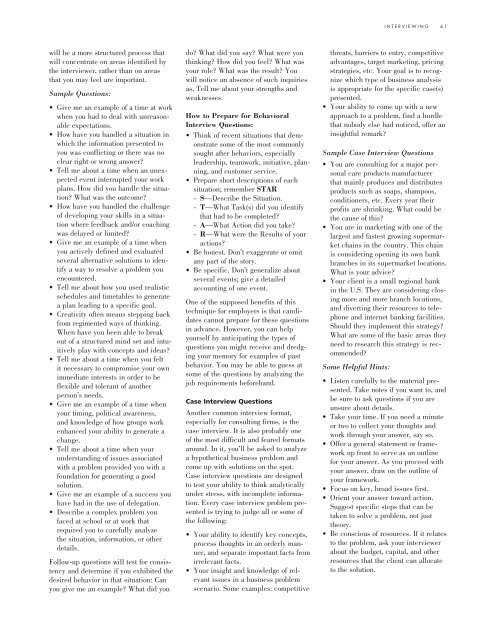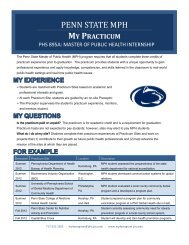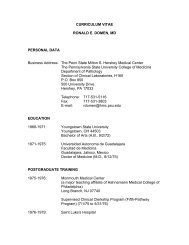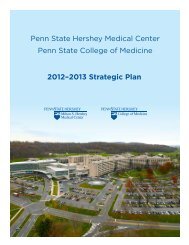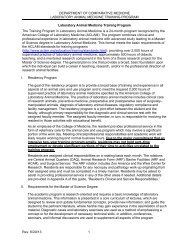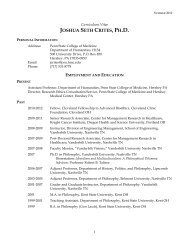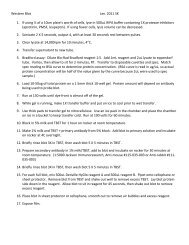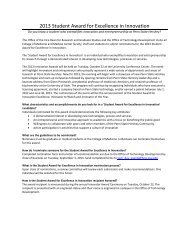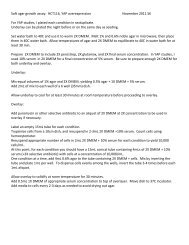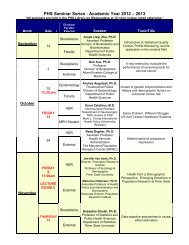Penn State Graduate Student Career Guide - Biomedical Sciences ...
Penn State Graduate Student Career Guide - Biomedical Sciences ...
Penn State Graduate Student Career Guide - Biomedical Sciences ...
You also want an ePaper? Increase the reach of your titles
YUMPU automatically turns print PDFs into web optimized ePapers that Google loves.
INTERVIEWING 41<br />
will be a more structured process that<br />
will concentrate on areas identified by<br />
the interviewer, rather than on areas<br />
that you may feel are important.<br />
Sample Questions:<br />
• Give me an example of a time at work<br />
when you had to deal with unreasonable<br />
expectations.<br />
• How have you handled a situation in<br />
which the information presented to<br />
you was conflicting or there was no<br />
clear right or wrong answer?<br />
• Tell me about a time when an unexpected<br />
event interrupted your work<br />
plans. How did you handle the situation?<br />
What was the outcome?<br />
• How have you handled the challenge<br />
of developing your skills in a situation<br />
where feedback and/or coaching<br />
was delayed or limited?<br />
• Give me an example of a time when<br />
you actively defined and evaluated<br />
several alternative solutions to identify<br />
a way to resolve a problem you<br />
encountered.<br />
• Tell me about how you used realistic<br />
schedules and timetables to generate<br />
a plan leading to a specific goal.<br />
• Creativity often means stepping back<br />
from regimented ways of thinking.<br />
When have you been able to break<br />
out of a structured mind set and intuitively<br />
play with concepts and ideas?<br />
• Tell me about a time when you felt<br />
it necessary to compromise your own<br />
immediate interests in order to be<br />
flexible and tolerant of another<br />
person’s needs.<br />
• Give me an example of a time when<br />
your timing, political awareness,<br />
and knowledge of how groups work<br />
enhanced your ability to generate a<br />
change.<br />
• Tell me about a time when your<br />
understanding of issues associated<br />
with a problem provided you with a<br />
foundation for generating a good<br />
solution.<br />
• Give me an example of a success you<br />
have had in the use of delegation.<br />
• Describe a complex problem you<br />
faced at school or at work that<br />
required you to carefully analyze<br />
the situation, information, or other<br />
details.<br />
Follow-up questions will test for consistency<br />
and determine if you exhibited the<br />
desired behavior in that situation: Can<br />
you give me an example? What did you<br />
do? What did you say? What were you<br />
thinking? How did you feel? What was<br />
your role? What was the result? You<br />
will notice an absence of such inquiries<br />
as, Tell me about your strengths and<br />
weaknesses.<br />
How to Prepare for Behavioral<br />
Interview Questions:<br />
• Think of recent situations that demonstrate<br />
some of the most commonly<br />
sought after behaviors, especially<br />
leadership, teamwork, initiative, planning,<br />
and customer service.<br />
• Prepare short descriptions of each<br />
situation; remember STAR<br />
- S—Describe the Situation.<br />
- T—What Task(s) did you identify<br />
that had to be completed?<br />
- A—What Action did you take?<br />
- R—What were the Results of your<br />
actions?<br />
• Be honest. Don’t exaggerate or omit<br />
any part of the story.<br />
• Be specific. Don’t generalize about<br />
several events; give a detailed<br />
accounting of one event.<br />
One of the supposed benefits of this<br />
technique for employers is that candidates<br />
cannot prepare for these questions<br />
in advance. However, you can help<br />
yourself by anticipating the types of<br />
questions you might receive and dredging<br />
your memory for examples of past<br />
behavior. You may be able to guess at<br />
some of the questions by analyzing the<br />
job requirements beforehand.<br />
Case Interview Questions<br />
Another common interview format,<br />
especially for consulting firms, is the<br />
case interview. It is also probably one<br />
of the most difficult and feared formats<br />
around. In it, you’ll be asked to analyze<br />
a hypothetical business problem and<br />
come up with solutions on the spot.<br />
Case interview questions are designed<br />
to test your ability to think analytically<br />
under stress, with incomplete information.<br />
Every case interview problem presented<br />
is trying to judge all or some of<br />
the following:<br />
• Your ability to identify key concepts,<br />
process thoughts in an orderly manner,<br />
and separate important facts from<br />
irrelevant facts.<br />
• Your insight and knowledge of relevant<br />
issues in a business problem<br />
scenario. Some examples: competitive<br />
threats, barriers to entry, competitive<br />
advantages, target marketing, pricing<br />
strategies, etc. Your goal is to recognize<br />
which type of business analysis<br />
is appropriate for the specific case(s)<br />
presented.<br />
• Your ability to come up with a new<br />
approach to a problem, find a hurdle<br />
that nobody else had noticed, offer an<br />
insightful remark?<br />
Sample Case Interview Questions<br />
• You are consulting for a major personal<br />
care products manufacturer<br />
that mainly produces and distributes<br />
products such as soaps, shampoos,<br />
conditioners, etc. Every year their<br />
profits are shrinking. What could be<br />
the cause of this?<br />
• You are in marketing with one of the<br />
largest and fastest growing supermarket<br />
chains in the country. This chain<br />
is considering opening its own bank<br />
branches in its supermarket locations.<br />
What is your advice?<br />
• Your client is a small regional bank<br />
in the U.S. They are considering closing<br />
more and more branch locations,<br />
and diverting their resources to telephone<br />
and internet banking facilities.<br />
Should they implement this strategy?<br />
What are some of the basic areas they<br />
need to research this strategy is recommended?<br />
Some Helpful Hints:<br />
• Listen carefully to the material presented.<br />
Take notes if you want to, and<br />
be sure to ask questions if you are<br />
unsure about details.<br />
• Take your time. If you need a minute<br />
or two to collect your thoughts and<br />
work through your answer, say so.<br />
• Offer a general statement or framework<br />
up front to serve as an outline<br />
for your answer. As you proceed with<br />
your answer, draw on the outline of<br />
your framework.<br />
• Focus on key, broad issues first.<br />
• Orient your answer toward action.<br />
Suggest specific steps that can be<br />
taken to solve a problem, not just<br />
theory.<br />
• Be conscious of resources. If it relates<br />
to the problem, ask your interviewer<br />
about the budget, capital, and other<br />
resources that the client can allocate<br />
to the solution.


